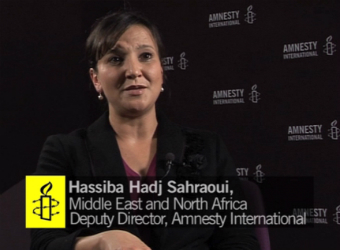Amnesty International has called on Egyptian authorities to ensure that ousted president Mohamed Morsi appears in court and has access to all available resources for his defence.
The Egyptian authorities must ensure ousted President Mohamed Morsi appears in court on Monday and is granted immediate access to a lawyer and all his rights of defence, said Amnesty International in a statement on Sunday.
The former President and 14 others, including members of the Muslim Brotherhood-affiliated Freedom and Justice Party and other Islamist groups, are due to stand trial on 4 November on charges of murder and inciting violence.
Mohamed Morsi and several of his aides have been held virtually incommunicado and in secret detention since 3 July in conditions that amount to enforced disappearance.
“Tomorrow’s trial is a test for the Egyptian authorities. They should present Mohamed Morsi in court and grant him a fair trial, including the right to challenge the evidence against him in court. Failing to do so would further call into question the motives behind his trial,” said Hassiba Hadj Sahraoui, Amnesty International’s Deputy Director for the Middle East and North Africa Programme.
“Mohamed Morsi was denied access to his lawyers while he was being interrogated and investigated. This significantly undermines his right to a fair trial. His enforced disappearance is also a serious human rights violation in itself and must be ended right away. He must be either released or transferred to a recognised place of detention and immediately given regular access to his family and lawyers.”
Lawyers representing the Muslim Brotherhood told Amnesty International that they doubt that Mohamed Morsi will be brought to court for the hearing.
“The trial cannot proceed without Mohamed Morsi’s presence in court. Everyone has a right to be present at their trial,” said Hassiba Hadj Sahraoui.
The charges against Mohamed Morsi in this case relate to violent clashes between his supporters and opponents on 5 and 6 December 2012 outside the presidential palace known as “Ittihadiya”. They include charges of murder, attempted murder, holding and torturing civilians, thuggery and threatening civilians as well as spreading rumours affecting the work of public institutions.
He also faces separate charges of helping prisoners -including himself- break out of Wadi Elnatroon prison during Egypt’s 2011 revolution with the help of the Palestinian movement Hamas, abducting security personnel and insulting the Egyptian judiciary.
Mohamed Morsi and Asaad al-Shikha, a presidential aide, were questioned by the Prosecutor without their lawyers present. Both men have been denied access to a lawyer and are therefore unable to effectively challenge the legality or conditions of their detentions. Mohamed Morsi has only been allowed to contact his family once since he was detained. His lawyers told Amnesty International that he considers the charges, the court panel and the current government to be illegitimate.
The lawyers told Amnesty International that they were only given access to the full case file, which is 7000 pages long, on 30 October. They had to pay a large fee of 15,000EGP(US$2,177) to obtain a copy of the file.
“This does not bode well for the fairness of this trial,” said Hadj Sahraoui. “Unacceptable obstacles are being placed before the defence. The delay in handing over the case file leaves the lawyers with insufficient time to prepare their defence, in breach with Egypt’s human rights obligations.”
Amnesty International also has concerns that justice is being undermined due to irregularities in the legal process in the trials of other Muslim Brotherhood leaders
Mohamed Morsi’s trial, along with 14 others including the Muslim Brotherhood politician Mohamed ElBeltagy will be held in a building annexed to Tora prison called the Tora Police Institute. Lawyers told Amnesty International that they object to holding trials inside prisons as it undermines the presumption of innocence. It also may interfere with the right to a public hearing.
Many Muslim Brotherhood leaders were questioned in prison rather than at the Prosecutor’s office or in the court complex. Several trials of Muslim Brotherhood leaders and Islamists have also been postponed because the Ministry of Interior failed to bring the defendants to the court for security reasons.
The trial of Hazem Salah Abu Ismail, a Salafist leader, was postponed three times because he was not brought into the court. His next hearing is scheduled for 18 November 2013. The trials of the Supreme Guide of the Muslim Brotherhood Mohamed Badie and his deputies Khairat Elshater and Rashad Bayoumy were also postponed after the defendants failed to appear before the court.
“Defendants are entitled to a fair trial within a reasonable time or to be released. It is not acceptable to continuously delay the process leading to extended detention,” said Hassiba Hadj Sahraoui.
